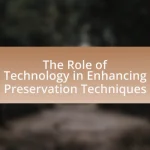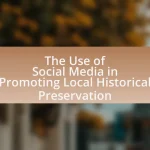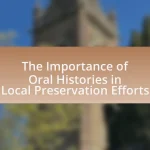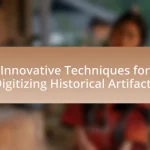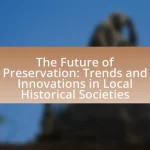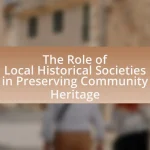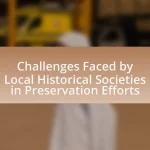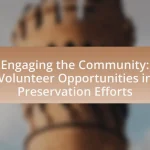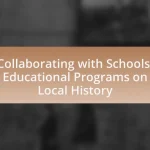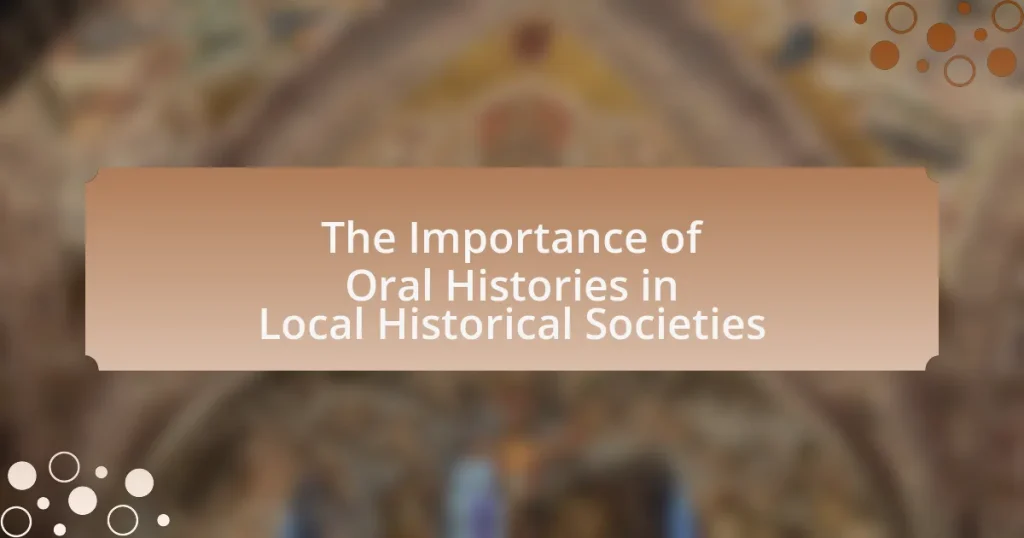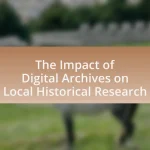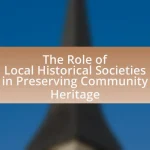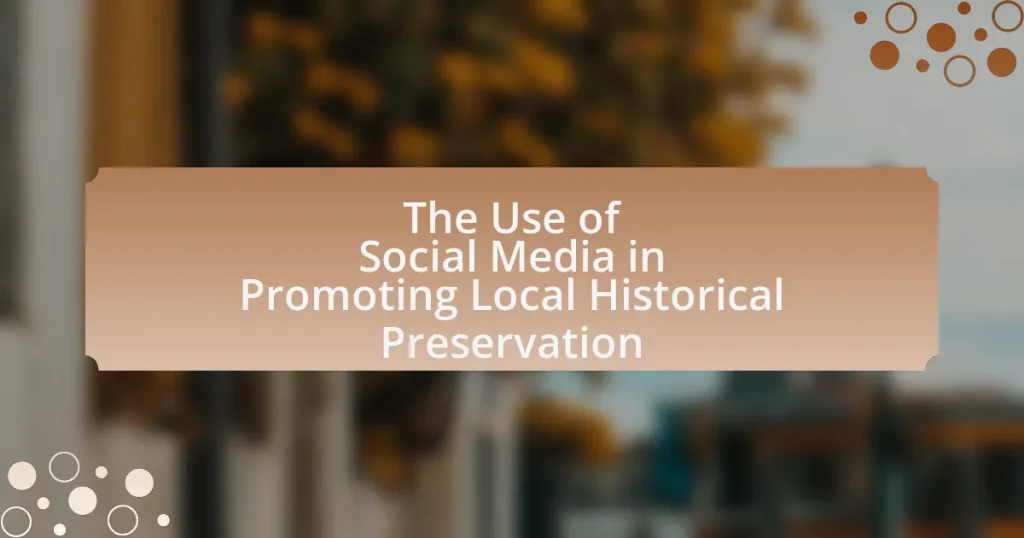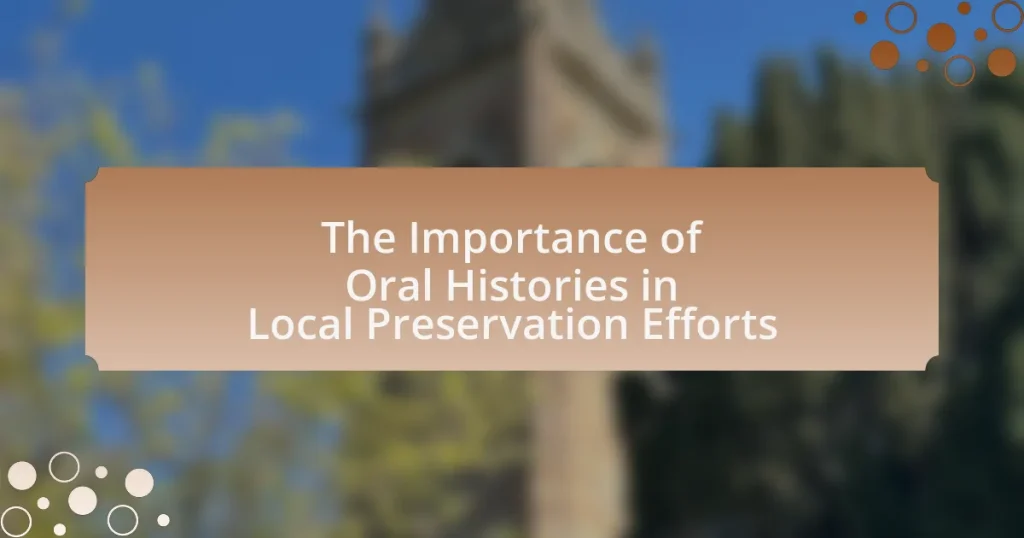Oral histories are recorded interviews that capture personal accounts and experiences related to historical events, playing a crucial role in local historical societies. They preserve diverse community narratives that complement traditional historical records, offering unique insights into social and cultural contexts often overlooked in written documentation. This article explores the significance of oral histories, their methods of collection, the challenges faced by local historical societies, and best practices for implementing sustainable oral history programs. It emphasizes the importance of ethical considerations, community engagement, and the use of technology in preserving and sharing these valuable narratives.
What are Oral Histories and Why are They Important in Local Historical Societies?
Oral histories are recorded interviews that capture personal accounts and experiences related to historical events, providing a unique perspective that complements traditional historical records. They are important in local historical societies because they preserve the voices and narratives of community members, ensuring that diverse experiences are documented and shared. This method enriches the understanding of local history by including perspectives that may be overlooked in written records, thereby fostering a more inclusive historical narrative. Additionally, oral histories can serve as valuable educational resources, helping future generations connect with their heritage and understand the complexities of their community’s past.
How do Oral Histories differ from traditional historical records?
Oral histories differ from traditional historical records primarily in their method of documentation and the nature of the information conveyed. Oral histories are collected through personal interviews and narratives, capturing individual experiences and perspectives, while traditional historical records typically consist of written documents, official accounts, and artifacts that provide a more formal and often standardized view of events. This distinction highlights that oral histories can offer rich, subjective insights into cultural and social contexts that may not be present in traditional records, which often focus on broader historical narratives and may overlook marginalized voices.
What unique perspectives do Oral Histories provide?
Oral histories provide unique perspectives by capturing personal narratives and lived experiences that are often absent from traditional historical records. These narratives offer insights into the social, cultural, and emotional contexts of historical events, allowing for a more nuanced understanding of the past. For instance, oral histories can reveal the impact of significant events, such as wars or migrations, on individual lives and communities, highlighting voices that may be marginalized in written accounts. This method of documentation enriches historical scholarship by incorporating diverse viewpoints, thereby fostering a more inclusive representation of history.
How do Oral Histories complement written documentation?
Oral histories complement written documentation by providing personal narratives and contextual insights that are often absent in written records. While written documentation captures factual information, oral histories convey emotions, perspectives, and cultural nuances, enriching the understanding of historical events. For instance, oral histories can reveal community values and social dynamics that are not reflected in official documents, thus offering a more holistic view of the past. This duality enhances historical research by allowing historians to cross-reference and validate information, leading to a more comprehensive narrative of local history.
Why should Local Historical Societies prioritize Oral Histories?
Local Historical Societies should prioritize Oral Histories because they capture personal narratives that provide unique insights into local culture and history. Oral histories preserve the voices and experiences of community members, often filling gaps left by traditional historical records. For instance, the Library of Congress has documented that oral histories can reveal social dynamics, cultural practices, and significant events from the perspectives of those who lived them, thus enriching the historical narrative. By prioritizing these accounts, societies can ensure a more comprehensive and inclusive representation of their community’s past.
What role do Oral Histories play in community engagement?
Oral histories play a crucial role in community engagement by preserving and sharing the lived experiences of individuals within a community. This method fosters a sense of belonging and identity among community members, as it allows them to connect with their shared past and understand diverse perspectives. Research indicates that oral histories can enhance community cohesion by encouraging dialogue and collaboration, as seen in projects like the “StoryCorps” initiative, which has recorded thousands of personal stories, promoting empathy and understanding across different demographics.
How can Oral Histories enhance the preservation of local culture?
Oral histories enhance the preservation of local culture by capturing personal narratives and experiences that reflect the unique traditions, values, and histories of a community. These narratives provide a rich, first-hand account of cultural practices and social dynamics that may not be documented in written records. For example, studies have shown that oral histories can reveal insights into local customs, dialects, and historical events, thereby contributing to a more comprehensive understanding of a community’s identity. By recording and sharing these stories, local historical societies can ensure that diverse voices are represented and that cultural heritage is maintained for future generations.
What are the Methods for Collecting Oral Histories?
The methods for collecting oral histories include interviews, focus groups, and community storytelling events. Interviews typically involve one-on-one sessions where a trained interviewer asks open-ended questions to elicit detailed personal narratives. Focus groups gather multiple participants to discuss specific topics, allowing for a dynamic exchange of stories and perspectives. Community storytelling events encourage individuals to share their experiences in a public setting, fostering a sense of community and collective memory. These methods are validated by their widespread use in historical research and preservation efforts, demonstrating their effectiveness in capturing diverse voices and experiences.
What techniques are effective for conducting Oral History interviews?
Effective techniques for conducting Oral History interviews include preparing open-ended questions, establishing rapport with the interviewee, and actively listening. Open-ended questions encourage detailed responses and personal narratives, which are essential for capturing rich historical context. Establishing rapport helps interviewees feel comfortable, leading to more candid and insightful answers. Active listening allows the interviewer to engage with the interviewee’s responses, prompting further discussion and exploration of topics that may arise during the conversation. These techniques enhance the quality of the oral history collected, ensuring that it is both informative and reflective of the interviewee’s experiences.
How can interviewers prepare for successful Oral History sessions?
Interviewers can prepare for successful Oral History sessions by conducting thorough research on the subject and the interviewee beforehand. This preparation includes understanding the historical context relevant to the interviewee’s experiences, which allows for more informed and engaging questions. Additionally, interviewers should create a structured outline of topics to cover while remaining flexible to follow the interviewee’s narrative. Familiarity with recording equipment and ensuring a comfortable environment for the interviewee are also crucial steps. These practices enhance the quality of the oral history collected, as evidenced by studies showing that well-prepared interviewers yield richer, more detailed narratives.
What ethical considerations should be taken into account during interviews?
Ethical considerations during interviews include informed consent, confidentiality, and respect for the interviewee’s dignity. Informed consent ensures that participants understand the purpose of the interview and agree to participate voluntarily, which is crucial for ethical research practices. Confidentiality protects sensitive information shared by interviewees, fostering trust and encouraging open dialogue. Respecting the interviewee’s dignity involves being sensitive to their experiences and perspectives, particularly when discussing potentially traumatic events. These considerations are supported by ethical guidelines from organizations such as the American Historical Association, which emphasizes the importance of ethical conduct in historical research.
How can technology aid in the collection and preservation of Oral Histories?
Technology aids in the collection and preservation of oral histories by providing tools for recording, storing, and sharing these narratives efficiently. Digital recording devices, such as smartphones and portable audio recorders, enable high-quality audio capture of interviews, ensuring clarity and fidelity. Cloud storage solutions allow for secure and accessible storage of these recordings, protecting them from physical degradation over time. Additionally, online platforms facilitate the sharing of oral histories with broader audiences, enhancing community engagement and educational opportunities. For instance, projects like StoryCorps utilize technology to archive personal stories, making them available for public access and preserving cultural heritage.
What tools and platforms are available for recording Oral Histories?
Tools and platforms available for recording oral histories include digital audio recorders, smartphones with recording apps, and specialized software like Audacity and GarageBand. Digital audio recorders, such as the Zoom H1n, provide high-quality sound capture, while smartphones offer convenience and accessibility through apps like Voice Memos and Otter.ai. Additionally, platforms like StoryCorps and Archive.org facilitate the collection and preservation of oral histories, allowing users to upload and share recordings. These tools and platforms are widely used in local historical societies to document and preserve community narratives effectively.
How can digital archives enhance access to Oral Histories?
Digital archives enhance access to oral histories by providing a centralized, searchable platform for storing and retrieving these narratives. This technology allows users to easily locate specific interviews or themes, increasing the visibility of diverse voices and experiences. For instance, the Library of Congress’s American Folklife Center has digitized thousands of oral history interviews, making them accessible to researchers and the public worldwide. This accessibility not only preserves cultural heritage but also encourages community engagement and education by allowing broader audiences to connect with local histories.
What Challenges do Local Historical Societies Face with Oral Histories?
Local historical societies face several challenges with oral histories, primarily including issues of preservation, accuracy, and accessibility. Preservation is difficult due to the ephemeral nature of oral recordings, which can degrade over time without proper storage conditions. Accuracy is a concern as personal recollections may be influenced by memory biases, leading to potential distortions of historical facts. Accessibility poses a challenge as oral histories may not be easily transcribed or indexed, making it hard for researchers and the public to utilize these valuable resources effectively. These challenges hinder the societies’ ability to maintain a reliable and comprehensive historical record.
What are common obstacles in collecting Oral Histories?
Common obstacles in collecting oral histories include participant reluctance, memory distortion, and logistical challenges. Participant reluctance often arises from fears of misrepresentation or privacy concerns, which can hinder engagement. Memory distortion occurs as individuals may unintentionally alter their recollections over time, affecting the accuracy of the narratives. Logistical challenges, such as scheduling interviews and accessing suitable recording equipment, can also impede the collection process. These factors collectively complicate the effort to gather reliable and authentic oral histories.
How can Local Historical Societies overcome issues of accessibility?
Local Historical Societies can overcome issues of accessibility by implementing digital platforms that provide online access to their collections and resources. By digitizing oral histories and making them available on websites or through mobile applications, societies can reach a broader audience, including individuals with mobility challenges or those living outside the local area. Research indicates that 70% of people prefer accessing historical content online, highlighting the demand for digital resources. Additionally, offering virtual tours and interactive online exhibits can further enhance accessibility, allowing users to engage with historical narratives from their homes.
What strategies can be employed to ensure diverse voices are represented?
To ensure diverse voices are represented, local historical societies can implement strategies such as actively seeking out underrepresented communities, creating inclusive outreach programs, and establishing partnerships with diverse organizations. Actively seeking out underrepresented communities involves identifying groups that have historically been marginalized and inviting them to share their stories. Creating inclusive outreach programs ensures that events and initiatives are accessible and welcoming to all demographics, which can include multilingual resources and culturally relevant programming. Establishing partnerships with diverse organizations can enhance credibility and broaden the reach of representation efforts, as these organizations often have established trust within their communities. These strategies are supported by research indicating that inclusive practices lead to richer, more comprehensive historical narratives, as evidenced by studies highlighting the positive impact of community engagement on historical documentation.
How can Local Historical Societies effectively promote their Oral History projects?
Local Historical Societies can effectively promote their Oral History projects by utilizing social media platforms, community events, and partnerships with local schools and libraries. Social media allows for broad outreach, enabling societies to share stories, engage with the community, and attract volunteers. Hosting community events, such as storytelling nights or workshops, fosters local interest and participation, while collaborations with educational institutions can integrate oral history into curricula, enhancing visibility and relevance. According to a study by the American Folklife Center, community engagement significantly increases the success of oral history initiatives, demonstrating the effectiveness of these promotional strategies.
What outreach methods can engage the community in Oral History initiatives?
Community engagement in Oral History initiatives can be effectively achieved through methods such as workshops, storytelling events, and social media campaigns. Workshops provide hands-on training for community members on how to conduct interviews and preserve oral histories, fostering a sense of ownership and participation. Storytelling events create a platform for individuals to share their narratives, enhancing community bonds and encouraging diverse voices. Social media campaigns can reach a broader audience, promoting awareness and inviting participation in oral history projects. These methods have been shown to increase community involvement and interest in preserving local histories, as evidenced by successful initiatives in various local historical societies across the United States.
How can partnerships with local organizations enhance visibility?
Partnerships with local organizations enhance visibility by leveraging their established networks and community trust. When local historical societies collaborate with organizations such as schools, libraries, or community centers, they gain access to broader audiences and resources. For instance, a partnership with a local school can facilitate oral history projects that engage students, thereby increasing awareness and participation in historical initiatives. Additionally, joint events or programs can attract media attention, further amplifying the reach of the historical society. Research indicates that community engagement through partnerships can lead to a 30% increase in participation rates for local events, demonstrating the effectiveness of such collaborations in enhancing visibility.
What are Best Practices for Implementing Oral History Programs?
Best practices for implementing oral history programs include establishing clear objectives, ensuring ethical guidelines are followed, and providing proper training for interviewers. Clear objectives help define the purpose of the program, whether it is to document specific events, preserve cultural heritage, or gather personal narratives. Ethical guidelines, such as obtaining informed consent and respecting the privacy of interviewees, are crucial for maintaining trust and integrity in the process. Training interviewers in effective questioning techniques and active listening enhances the quality of the interviews. Additionally, utilizing appropriate recording equipment and ensuring proper archival methods for the collected materials are essential for preserving the oral histories for future generations. These practices are supported by organizations like the Oral History Association, which provides resources and standards for conducting oral history projects effectively.
How can Local Historical Societies create a sustainable Oral History program?
Local Historical Societies can create a sustainable Oral History program by establishing clear objectives, engaging community members, and securing funding. Clear objectives guide the program’s focus, ensuring that the collected histories align with the society’s mission. Engaging community members fosters participation and ownership, which is crucial for long-term sustainability; for instance, involving local schools can attract younger generations. Securing funding through grants or partnerships with local businesses provides the necessary resources for training volunteers and maintaining equipment. According to the American Folklife Center, successful oral history projects often rely on community involvement and financial support to thrive.
What resources are available for training volunteers in Oral History collection?
Resources available for training volunteers in Oral History collection include comprehensive training manuals, online courses, and workshops offered by organizations such as the Oral History Association and local historical societies. These resources provide guidelines on interviewing techniques, ethical considerations, and archival practices. For instance, the Oral History Association offers a “Best Practices for Oral History” guide, which outlines essential skills and methodologies for effective oral history collection. Additionally, many universities provide free or low-cost online courses that cover the fundamentals of oral history, enhancing volunteers’ understanding and capabilities in this field.
